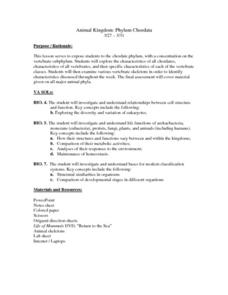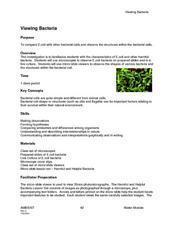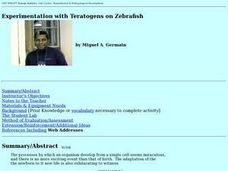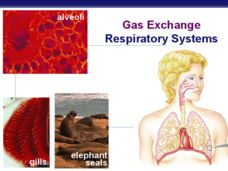Curated OER
Eukaryotes vs. Prokaryotes
Seven simple slides list characteristics of eukaryotic and prokaryotic cells. After viewing this presentation, future biologists will be also able to name the unique characteristics of plant, animal, and fungal cells. Ideally, you would...
Curated OER
The Five Kingdoms
An overview of the five kingdoms within the biological classification system is presented in this set of five slides. The first lists the objectives of the slide show, and the second gives general characteristics of plant, animal, and...
Curated OER
Exploring Film Genres for Telling Hero Stories: Animated Shorts
Students will create short movies. The integration of technology into the curriculum is important for learners to apply in various ways. This lesson is an example of that kind of integration.
Curated OER
Animal Kingdom: Phylum Chordata
Learners use a dichotomous key to classify various vertebrate jar speciments into classes. They examine the speciments for general characteristics of each class and fill in a corresponding chart and then complete a few final assessment...
Curated OER
Cellular Cellebrities
Sixth graders, in groups, learn the morphology and function of organelles within plant and animal cells.
Alabama Learning Exchange
Mitosis: Divide to Survive
Learners identify the purpose of cellular mitosis. They work in groups of four to use images of animal and plant cell mitosis to illustrate each step in the mitosis process on their graphic organizer.
Curated OER
Using Microscopes
Students do an experiment using a microscope. In this lesson, about cells, students examine different slides using a microscope. Students look at an onion skin, cheek cells, and potato cells. In each of these, students find cell walls,...
Curated OER
Mitosis and Meiosis
Students create a movie of animal cell mitosis. They draw steps regarding the stages of cell mitosis. They add beginnings, movie titles, and ending credits. They present the movie to their teacher.
Curated OER
Building a Clay Neuron
Learners investigate and then build neurons in this lesson. They are examined as key parts of the brain and nervous system and seen as different from normal cells.
Curated OER
Mitosis and Meiosis Exercise
In this cell division worksheet, students answer 15 multiple choice questions about both mitosis and meiosis. Topics include the outcomes of the processes, the phases of the processes and steps within each process.
Curated OER
Body Plans and Adaptations
In this body plans and adaptations activity, students will review the different types of symmetry found in organisms. Students will identify body parts as found on either the ventral or dorsal part of an animal. Then students will look...
Curated OER
Viewing Bateria
Students use microscopes to observe E. coli bacateria on prepared slides and in a live culture. They use micro-slide viewers to observe the shapes of various bacteria and the structures within the bacterial cell. Students make an...
Curated OER
Photosynthesis and Cellular Respiration
In this energy worksheet, learners review the processes that create energy for a cell: photosynthesis and cellular respiration. This worksheet has 11 fill in the blank and 14 short answer questions.
Curated OER
Experimentation with Teratogens on Zebrafish
Pupils compare mitosis and meiosis with regard to chromosome number in parent cells versus daughter cells, types of cells produced, total number of cells produced, and the number of divisions. In groups, identify and differentiate the...
Curated OER
Testing for Catalase Activity
For this catalase worksheet, students read about how enzymes work in cells. Then students conduct an experiment to test for catalase activity in potatoes. This worksheet has 1 graph and 6 short answer questions.
Curated OER
Edible DNA
Students use multicolored soft candies (gumdrops and candy orange slices) and toothpicks to create models of DNA structures. They discuss the fact that DNA must copy itself before splitting into two cells. Students demonstrate this by...
Curated OER
Identification of Animals by Serum Electrophoresis
Students compare their unknown serum against a set of known serum standards and determine the animal source of their serum. They write a lab report to communicate their results.
Curated OER
Dissect with Respect
Students, through exercises and discussions, examine ethics involved in the process of choosing and using laboratory animals, respect for the animal they dissect and how to behave in an ethical manner as they dissect various lab specimens.
Curated OER
Broken Bones
Students listen to a lecture on broken bones. They review the proper first aid techniques and practice setting splints on one another. They observe X-rays and animal bones.
Curated OER
Vertebrate Skeletons
In this biology worksheet, students examine the human skeleton and then classify animal bones according to their similar function.
Curated OER
Gas exchange: Respiratory Systems
The need for a respiratory system in humans versus being reliant on gas exchange structures is demonstrated. There are many details about the advantages and disadvantages of each mechanism. Students are able to learn about the...
Curated OER
Gas Exchange And Respiratory Systems.
Explore structures within the realm of gas exchange in terrestrial and aquatic life. The excellent, labelled diagrams and clear descriptions help your students view the different structures and adaptations that have...
Curated OER
Muscles and Motor Locomotion
This is a fabulous presentation which should reinforce all aspects of muscle construction on a gross anatomical and micro level. There are slides to help understanding with the muscle fiber anatomy, and many labelled diagrams to...
Curated OER
Circulatory Systems
Excellent diagrams, labels and summaries make this resource be valuable to your students throughout the topic of circulation. All types of circulation vessels are explained, their structure and function is detailed, and the overall...























